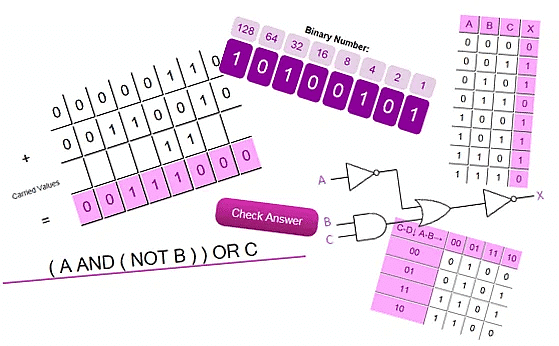Binary logic is a fundamental concept in the Logical Reasoning section of the Common Admission Test (CAT). It plays an important role in determining the truth value of statements, which is essential for solving various types of logical reasoning questions. In CAT, binary logic questions usually involve reasoning about statements made by different types of people (truth-tellers, liars, or alternators) to determine the correct answer.
What is Binary Logic?
Binary logic derives its name from Boolean logic, and operates within a system of two values: true and false. It is a subset of Boolean algebra, where variables can only take on these two truth values.

- Binary logic is governed by a set of rules derived from mathematical binary operations, including NOT, AND, and OR.
- In binary logic, there are only two possible truth values: True or False. The outcomes for a given problem are determined based on the instructions provided.
- The notation used in binary logic can vary significantly, so it is important to be consistent in how binary logic is expressed to avoid confusion.
Concepts Required to Solve Binary Logic Problems
In these types of problems, we have people who either speak a true statement or a false statement. Hence, these people are divided into three categories:
- Truth Teller: This person always speaks the truth. All their statements are true.
- Liar: This person always lies. All their statements are false.
- Alternators: This person alternates between truth and lies.
Alternator Statements
- If their first statement is true, then the second will be false, the third true, and so on.
- If their first statement is false, then the second will be true, the third false, and so on.
- There is no fixed number of statements, but the order always alternates: TRUE-FALSE-TRUE or FALSE-TRUE-FALSE.
Binary logic questions are all about making some assumptions. These assumptions can lead to contradictions, which show that our assumptions might be incorrect. If for any assumption we do not get even a single contradiction, then that is the solution for the given problem.
Types of Binary Logic Questions
Type 1
In this type, three individuals make two statements each, with one being true and the other false. Consider the following logical aspects:
- The logical content of the statements.
- The truthfulness of the statements, where one is true and the other is false, or vice versa.
Type 2
This question involves two types of people:
- Those who always tell the truth.
- Those who always lie.
If a person always tells the truth, then every statement they make must be true. However, conflicts can arise if a statement is clearly false.
Question for Introduction & Examples: Binary Logic
Try yourself:Read the following paragraph and answer the question that follow.
There are two types of inhabitants in Tatabalery- A type & B type. The A type of inhabitants always speak the truth and the B Type of inhabitants always lie.
Q: Booker says," At least one person among Shane and I always lie." What types are Booker and Shane respectively?
Explanation
-
Assume Booker is an A‑type (truth‑teller).
– His statement “At least one of Shane and I always lie” must be true.
– Booker himself tells the truth, so the “one who lies” must be Shane.
⇒ Shane is a B‑type (liar).
-
Assume Booker is a B‑type (liar).
– His statement is false, so “At least one of Shane and I always lie” is false.
– That would mean neither of them always lies, i.e. both are truth‑tellers.
– Contradiction, since we assumed Booker lies.
Only the first assumption works.
Answer: Booker is A‑type (truth‑teller) and Shane is B‑type (liar).
Report a problem
Step-wise Solved Examples
Example 1: Three boys- Aman, Bagheer, and Chiru replied to the question, “Who among you is a Doctor?” in the following manner:
We know exactly one of these boys is a Doctor, one is a Painter, and one is an Athlete.
Further, one always speaks the truth, one always lies, and one alternates between the truth and the lie.

Steps to Solve Binary Logic
With the help of some statements made by these people, we might be able to identify them without any assumption. Here is a list of 4 statements that one must always look out for to make the task easier. If any one of these is made by any person, then we can categorise them as explained below.
1. I am a liar
- Consider if a truth-teller says, “I am a liar”, which is a lie, as a truth-teller can only say, “I am a truth-teller”. Hence, we can conclude that the person who said “I am a liar” is not the truth-teller.
- Similarly, if a liar says that he/she is a liar, then that statement will be true, but the liar will always speak the lie. None of the statements made by him/her can be true. We can conclude that this statement cannot be made by a liar.
- The only category of person who can speak this statement is the alternator. He can alternate between the truth and the lie. Since he/she is not a liar but he/she can still make a false statement, an alternator is the only category of people who can make the statement, “I am a liar”. The statement in itself will be a lie.
- This gives us another hint that the statements immediately before and after this statement will always be true.
2. I am not a truth-teller
- Similar to the explanation above, a truth-teller can never make this statement because if he/she makes this statement, then it will be a lie which contradicts the fact that a truth-teller always speaks the truth.
- If the liar makes the above statement, then it will be the truth for him, which again contradicts the fact that a liar will always lie.
- Hence, a liar cannot make this statement.
- The alternator can say, “I am not a truth-teller”, as he can say either the truth or the lie. This statement will be a true statement for him, which gives us another hint that the statements preceding and following this statement are lies.
3. I am an alternator
- A truth-teller cannot make this statement, as this statement will be a lie for him, which conflicts with the fact of the truth-teller.
- A liar can make this statement as this statement will be a lie for him/her.
- An alternator can also make this statement, and this will be the truth for the alternator.
- We can conclude that this statement can be made by the liar or the alternator.
4. I am not an alternator
- Similar to the above statement, a liar will not make this statement.
- A truth-teller can make this statement.
- An alternator can make this statement, and this time it will be the lie for him/her.
Summary to Explain Example 1
- In our example question, Bagheer makes the statement, “I am a liar”, which implies that Bagheer is the alternator. Also, Aman said that he is an alternator, which implies that he can be either a liar or an alternator. Now, since Bagheer is the alternator, Aman is definitely the liar.
- This leaves us with Chiru as the truth-teller. Since Bagheer is the alternator, the statements immediately before and after the statement, “I am a liar”, are true; we can conclude that Aman is not a Doctor.
- Also, as Chiru is a truth-teller, according to his statements, Bagheer is not a painter, and he himself is not a painter; thus, Aman is the painter. Now, Bagheer’s first statement is a lie (since the third statement is also a lie, so the order for Bagheer’s statements will be 1st-false,2nd-true,3rd-false). This means Chiru is not an athlete, which leaves us with the only option for Chiru as a Doctor, and Bagheer will then be an athlete.
- To summarise our findings:

So the answer to the question, ‘Who is a Doctor’, is Chiru.
Other statements, such as “I am a truth-teller”, can be made by all three categories of person and so will not be of much help to us.
Step 2
- In some cases, where none of the four statements as mentioned in step 1 was made by anyone, we will use the assumption-iteration method.
- In this method, we will assume the first person as the truth-teller, and based on his statements, we will try to find conflicts or contradictions that may arise due to the statements made by others.
- We will also use the assumptions-iteration method when statement 3 or 4 mentioned in step 1 is made by anyone, as these statements will leave us with two options.
Example 2: Utkarsh, Ravi, and Shivam made the following statements regarding the type of vehicle they own. Each one of them belongs to exactly one category of truth-teller, liar or alternator. Only one among them is a truth-teller. Further, we know each of them owns a different vehicle and each of them owns exactly one among a car, a cycle and a bike.

Solution:
- Now, Utkarsh says that he is not an alternator, and as per step 1, we know that he can be a truth-teller or an alternator.
- To proceed with the approach, we will first assume that Utkarsh is the truth-teller and all the statements are true. We know exactly one among them is telling the truth, and we already assumed Utkarsh as the truth-teller.
- The question does not specifically mention the exact number of each category. From Utkarsh’s statements, we know neither Shivam nor Ravi owns a car. Reading Ravi’s statements, since his last statement is true so he should be an alternator (he can’t be the truth-teller as there is only one truth-teller, which we already assumed as Utkarsh).
- This implies his second statement should be false, but according to Ravi’s statements, the second one turns out to be true.
- This is a contradiction to our assumption, which means that our assumption is wrong.
We have to go for the second iteration, knowing Utkarsh is the alternator. - As he is not the truth-teller, he has to be an alternator. His second statement is false, which automatically makes his first and third statements true.
- We can deduce that Utkarsh owns a car as none of Ravi nor Shivam owns a car, as per Utkarsh’s statements. Shivam’s first statement is a lie, so he can be a liar or an alternator. Since there is one truth-teller and the only option for the truth-teller is Ravi, we can say Ravi is the truth-teller.
- This makes Shivam’s second statement true, and so we know that Shivam is an alternator. Since Shivam does not own a cycle, Ravi must own the cycle, and Shivam owns the bike.
Directions for examples 3 & 4: Read the following paragraph and answer the questions that follow.
There are two types of inhabitants in Tatabalery- A type & B type. The A-type of inhabitants always speak the truth, and the B-type of inhabitants always lie.
Example 3: Rocky says, " I always lie." Which type of inhabitant is he?
(a) A
(b) B
(c) Either A or B
(d) The given statement is infeasible
Ans: (d)
Example 4: Peter says," According to Rocky, I always speak the truth." Which of the following is a correct conclusion?
(a) Peter has to be of type A
(b) Peter has to be of type B
(c) Rocky has to be of type A
(d) Rocky has to be of type B
Ans: (c)




























